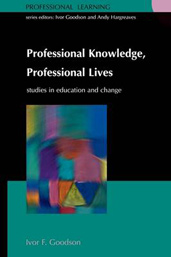Professional Knowledge, Professional Lives: studies in education and change
Educational Research as a Public Intellectual
Certainly, histories of the relationship between theory and practice point to wide differentials in the gap between the two. Far from being wide and intractable, the dichotomy seems to be, at least partially, tractable and highly variable over time. Simon (1985) examined the relationship between theory and practice in three periods 1880-1900, 1920-1940 and 1940-1960. In the first and last periods he found a 'close relation between theory and practice'. For instance, in the period 1880-1900:
For a whole concatenation of reasons, and from a variety of motives, it was thought that the masses should be educated, or at least schooled - and they were. This whole enterprise was, as it were, powered by an ideology - or theoretical stance - which emphasised the educability of the normal child, a view underpinned by advances in the field of psychology and physiology relating to human learning (Simon, 1985, p. 49).
The point underlined by the quote and the evidence about this historical period is that the potential for a close relationship, or at the other extreme no relationship, between theory and practice depends on the political conditions of the time, particularly as expressed in the social purposes and missions defined for our public schools.
So we have to return to the point of rupture in the 1970s where increasingly divorced educational theory led to calls for applied research and a return to practice. This rupture was hijacked to develop a whole scale evacuation of theory and a return to classrooms and practice. From now on the design of education was moved away from the intellectuals, the educationists and firmly placed in the hands of politicians. Only new alliances between theory and practice can re-make the possibility for educational research to contribute to new visions and new structures of education.
The concern is how to develop collaborative modes in ways which maintain, revive and re-inscribe theoretical and critical missions within teacher education. In current political times this is clearly not an easy act to accomplish, even when thinking theoretically, but it does mean that we need to look closely at the potential collaboration between teachers and externally located researchers in faculties of education. Whilst I believe that the best mechanism for improving practice is if teachers, in an ongoing way, research and reflect upon their practice, I do not believe that a narrow focus on practice in collaborating on research, a panacea that is politically popular at the moment, will take us very far. There are many reasons for this contention. Let me focus on two. First, education is far more than a practical matter. Practice constitutes a good deal more than the technical things teachers do in classrooms. Education is a personal matter as well as a political matter. The way teachers interact in classrooms relates in a considerable way to who they are and to their whole approach to life. It would be important, therefore, to have a collaborative form of research which links and analyses the teacher's life and work. Secondly, the interactive practices of classes are subject to constant change, particularly, at the moment, political and constitutional change. These often take the form of new government guidelines. To stay only with practice as a politically and socially constructed form is inevitably to involve teachers in the implementation and acceptance of initiatives which are generated elsewhere. This would make collaboration and research into a form of political quietism.
